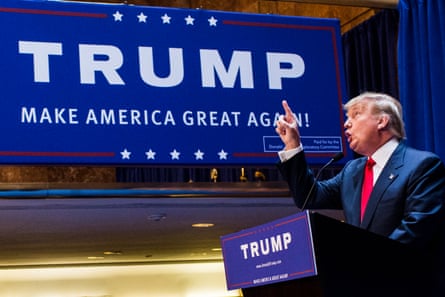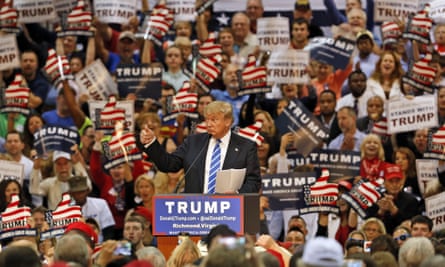Given everything that has happened in the past four years, it’s not a huge surprise to learn that the first words of Donald Trump’s 2016 presidential campaign were a lie.
Four years ago, on 16 June 2015, after Trump had slowly descended a golden escalator to the basement of his eponymous New York tower, he clambered on to a makeshift stage and began his announcement speech.
“Wow. Woah. That is some group of people. Thousands!” Trump said, looking out towards a bank of TV cameras.
Except that’s not how people who were there remember it.
“There were a few dozen people lining the area leading down to the escalator, and then there were a couple dozen downstairs where the event actually took place,” said Alana Wise, who covered the campaign launch for Reuters news agency.
“That kind of frenetic energy that we got later on,” Wise said, “it just wasn’t there.”
Trump’s misinterpretation of the number of attendees kicked off what would be a surreal afternoon, as the businessman set off on an offensive, angry speech, the nadir of which saw Trump accuse Mexico of sending “rapists” to the US.
The rhetoric worked: he was soon at the top of the Republican polls. But it’s a sign of how Trump’s candidacy was viewed that covering his campaign wasn’t seen as a particularly senior gig.

Wise said: “I was an intern at Reuters at the time. It was one of my first assignments out of the office.”
In the days following Trump’s announcement, it emerged that the Trump campaign had paid people $50 to attend the event. “We are looking to cast people for the event to wear T-shirts and carry signs and help cheer him in support of his announcement,” read the casting call. Wise, now a reporting fellow for WAMU radio’s Guns and America project, remembers it being an unusual audience.
“There were some people who lived in the building who had come down, and then there were just a lot of people just kind of from off the street who had come in to see it,” she said. “There was a lot of just random curiosity happening.”
Charlotte Alter was far from a veteran political correspondent when she covered Trump’s launch. In 2015 she was a junior reporter for Time magazine, keen to get involved in coverage of the presidential election.
“I, at the time, was a very junior reporter and I was based in New York. So in some ways sending me was … they were kind of throwing me a bone, I think.”
At Trump’s later campaign rallies he would play music by the Rolling Stones, Queen and Neil Young – each of whom asked him to stop doing so. But at the campaign launch, he took a different tack. Alter, who co-wrote Time’s story with then political correspondent Alex Altman, remembers The Music of the Night, from Andrew Lloyd Webber’s Phantom of the Opera, being blasted on repeat while journalists waited for Trump’s descent.
Before the speech, Trump’s fledgling campaign staff had circulated planned remarks, Alter said, but Trump quickly went off script.
“When Mexico sends its people, they’re not sending their best,” Trump said, as he claimed the country was dispatching immigrants to the US. “They’re sending people that have lots of problems, and they’re bringing those problems with us [sic]. They’re bringing drugs, they’re bringing crime, they’re rapists. And some, I assume, are good people.”
Trump was best known internationally for his hair, TV show, and proclaimed wealth. In the US, however, he had been waging what many saw as a racist “birther” campaign against Barack Obama for years, falsely claiming the then president had been born in Kenya. But even for close Trump watchers, the speech represented new extremes.
“I don’t think anybody came away from that announcement thinking he was going to be the next president. But it was clear immediately afterwards that his talent for getting attention was going to serve him well,” Alter said.
For Heather Haddon, then a political reporter at the Wall Street Journal, one of the surprises was that Trump had finally done it. The president likes to insist that 2016 was the first time he had run for office, but as far back as 1988 he had flirted with running, and he ran for the Reform party nomination in 1999.
“Definitely the sense was … there’s no way this guy is going to make it,” Haddon said.
As for the event itself, Haddon remembers there being an “almost pro-wrestling” tone to the announcement.
“It was angry but it was also so matter-of-fact,” said Haddon, who now covers business at the Journal. “It just seemed so stream-of-consciousness. Going from one topic to another, things that might, I guess, excite people, set people off. It was all just sort of spewed out there.”

The speech set a precedent for the freewheeling addresses Trump made throughout his campaign, and has continued to make in the White House.
“I think everyone just left there shocked,” Haddon said.
The Guardian dispatched business reporter Rupert Neate to Trump Tower. Neate, who is British, remembers that colleagues at the time didn’t think it was “particularly a big deal”, but recalls then being stunned by the content of Trump’s speech.
“I thought, if it was Britain and someone was to come and say all those extreme things, you’d think it was sort of like a far-right, extreme-slash-jokey candidate, and there’s no chance he’s ever going to win this,” Neate said.
“But look how wrong that assumption would be.”
Trump is due to launch his re-election campaign Tuesday in Orlando. This time, there really will be thousands in attendance, but whether they will leave with as vivid memories as those who witnessed the 2015 launch remains to be seen.
Alter, now a national correspondent for Time, has written extensively about US politics in the past four years, but said she often thinks of that June afternoon in 2015.
“At the time – I don’t know if it’s still there – there was a Trump ice-cream parlor,” she said.
Behind the counter was a man who told Alter he was from Mexico. Alter didn’t use him in the story, she said, uncomfortable about whether it could affect his job or immigration status, but she had “thought a lot” about him since.
“This was the speech where Trump said the thing about Mexicans as rapists. And 40ft in front of him, behind all the cameras there is a guy from Mexico, almost certainly an undocumented immigrant, scooping ice cream for Trump banana splits, wearing a hat that says Trump ice cream on it,” Alter said.
“It was just so interesting to me that literally, you know, Trump is speaking to this crowd and there are all these cameras, and then behind the cameras, behind the crowd, in his line of vision, there’s this guy standing directly in front of him, who is a perfect example of all of the sort of contradictions at work in this campaign.”
